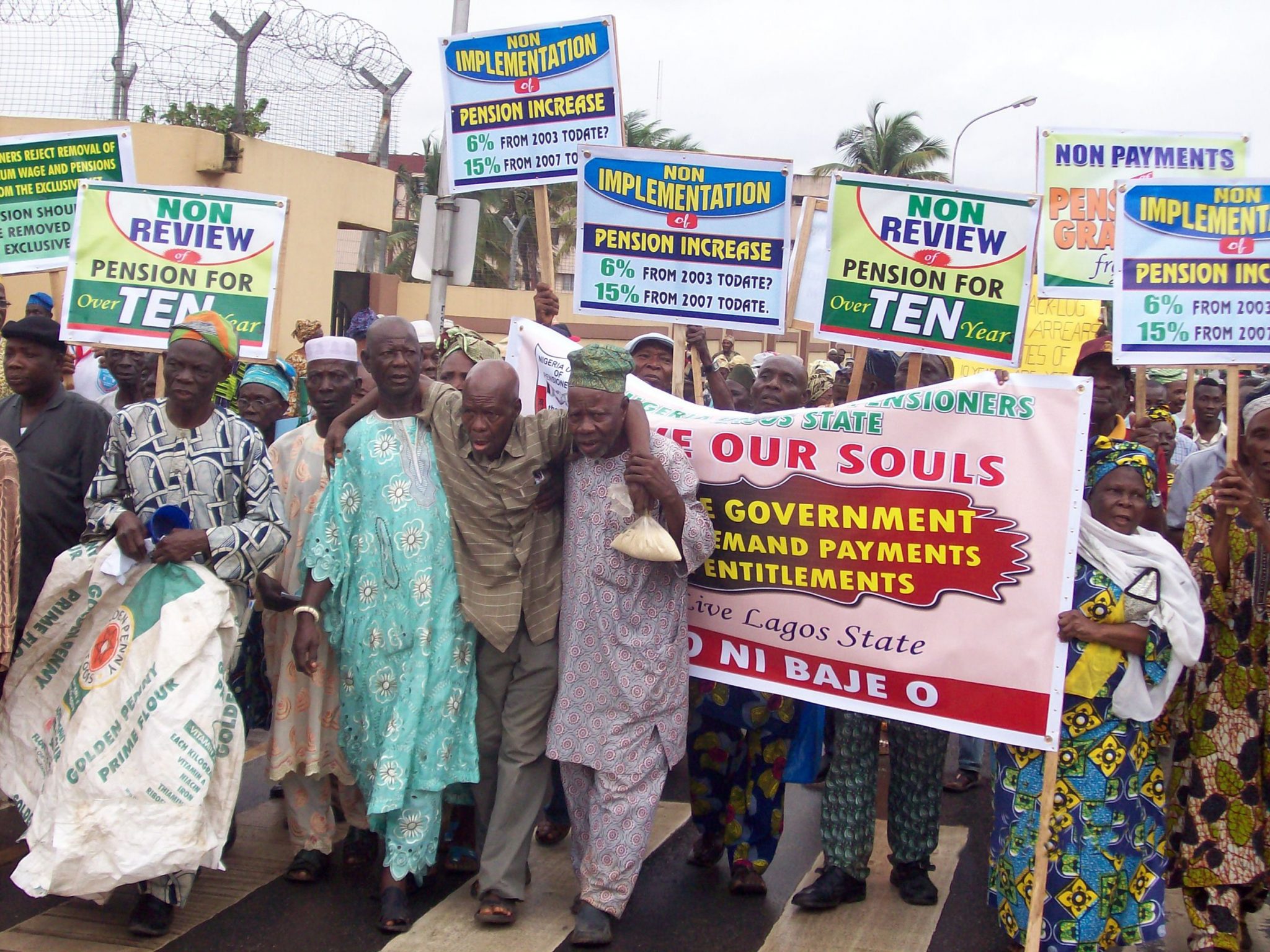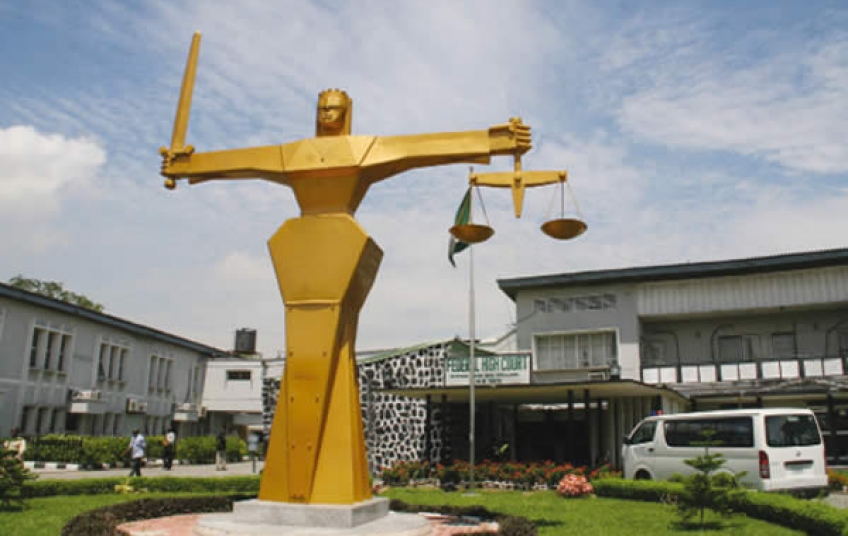SERAP, Pensioners Seek ECOWAS Court Intervention Over Unpaid Pensions, Salaries
Socio-Economic Rights and Accountability Project (SERAP), Federal Civil Service Pensioners Association, and Association of Retired Local Government Staff and Primary School Teachers in Delta State have asked the ECOWAS Court of Justice in Abuja to “order the government of President Muhammadu Buhari to deduct the pensions, salaries and gratuities of pensioners and workers across several states of Nigeria from the statutory allocations of the indebted state governments and pay same directly to the pensioners and workers on a-monthly basis.”
The plaintiffs are suing over “violations of the human rights of workers and pensioners to equality and equal treatment; equal protection of the law and non-discrimination; to dignity and independence; to adequate standard of living and well-being; to property; to work; to family life; and to economic and social development.”
The plaintiffs want “immediate payment of all outstanding pensions, salaries and gratuities through deductions from statutory allocations of the indebted state governments, and payment of adequate money compensation of N50 million to each of the pensioners and workers who are plaintiffs, and to pay other unpaid Nigerian pensioners and workers adequate compensation.”
Other plaintiffs joining SERAP in the suit number ECW/CCJ/APP/39/2017 filed last Friday are: First Bank of Nigeria Pensioners (Lagos); Mrs Comfort C. Owoha; Joseph Agabi; Osemwenkha G.O, and Mrs J.E. Enabunlele. The plaintiffs are suing for themselves and on behalf of their members and other workers and pensioners across the country whose salaries and pensions have not been by the states and Federal Government for several months.
In the suit filed on their behalf by Solicitor to SERAP Femi Falana SAN, the plaintiffs argued that, “The retirement system in Nigeria violates the right to equal protection of the law and dignity since senior public officials continue to receive “privileged pensions”, salaries and gratuities while the 2nd—7th plaintiffs, their members and several other Nigerian pensioners and workers continue to be denied their entitlements, salaries and gratuities. ‘Dignity’ here refers to the right to live in security and free of exploitation, abuse, and discrimination.”
The plaintiffs also argued that, “Under international law, Nigeria cannot invoke the provisions of its internal laws or the nature of its federation as justification for its failure to perform a treaty obligation. A fundamental rule of the law of State responsibility is that a State cannot escape its responsibility on the international plane by referring to its domestic legal situation.”
The suit read in part: “Ultimately, the Federal Government cannot escape its responsibility to achieve the effective realization of the rights of Nigerian workers and pensioners to timely and regular payment of salaries, entitlements and gratuities, as it retains ultimate responsibility to ensure the rights of workers and pensioners are fully realized.”
“Workers and pensioners in several states in Nigeria have been victims of violations of civil and political rights and even more severely, of economic, social, and cultural rights. The 2nd-7th plaintiffs and their members and other Nigerian pensioners and workers have experienced extreme poverty, discrimination, social exclusion, stigmatization, and deprivation of protections and entitlements on an ongoing basis due primarily to the failure and/or negligence of the Federal Government to ensure that several states of Nigeria pay accrued pensions, salaries and gratuities.”
“By granting the reliefs sought, the ECOWAS Court would be recognizing and reiterating the need for the government and its federating units to protect the rights and interests of the vulnerable, disadvantaged, and marginalized groups.”
“Despite their obligations to protecting the human rights of vulnerable, disadvantaged and marginalized individuals and groups, the government has failed to prevent the systematic violation by several states of the federation of a wide range of human rights as a result of the continuing failure and/or negligence to ensure that the states timely and regularly pay workers’ salaries and pensioners’ entitlements and gratuities.”
“The government has failed and/or neglected to ensure the timely payment of over 42 months of outstanding pensions and gratuities in Edo State of Nigeria despite Edo State receiving funds in the form of over N29 billion Paris Club refunds between November 2016 and July 2017 from the government.”
“The government has since 2013 failed and/or neglected to ensure payment of accrued pensions and gratuities to about 4000 members of the Association of Retired Local Government Staff and Primary School Teachers in Delta State across 25 Local Government Councils of the State, leaving the pensioners to live in extreme poverty.”
“Mrs Comfort C. Owoha served for 35 years as staff of the Sokoto State Primary School Board. But payment of her pensions expected to commence in 2001 after verification was inexplicably stopped by the Sokoto State Government.”
“The government has failed to exercise due diligence, leading to the refusal and failure of the First Bank of Nigeria PLC to pay its pensioners accrued entitlements and gratuities and when pensions and gratuities are paid the Bank pay as low as N11,000, 13,000 as pensions despite the enormous amount in the Banks’s pension fund.”
“The government has since December 2014 failed and/or neglected to ensure that Osun State of Nigeria remits monthly pensions deducted from the contributory pensioners. The government has also failed and/or neglected to ensure regular and timely payment of pensions and gratuities in Osun State, and that contributory pensioners have not been paid since January 2015.”
“The government has failed and/or neglected to pay members of the Federal Civil Service Pensioners Association of Nigeria accrued pensions. The government continues to engage the Nigeria Union of Pensioners while deliberately sidelining the Federal Civil Service Pensioners Association of Nigeria and its members. The government is failing and/or refusing to ensure payment by several states of Nigeria of workers’ salaries and pensioners’ entitlements, amounting to billions of Naira in arrears.”
“International human rights treaties to which Nigeria is a state party impose obligations on the government to ensure that economic difficulties and times of severe resource constraints cannot be used to undermine the enjoyment of the human rights of workers and pensioners in Nigeria, and disproportionately hurt them.”
“The right to timely and regular payment of pensions and salaries is essential, particularly when a person does not have the necessary property available, or is not able to secure an adequate standard of living through old age or economic and social factors.”
“According to the Nigeria Union of Local Government Employees (NULGE), 23 states of the federation currently owed workers arrears of salaries ranging from one to 24 months. The NULGE gave the breakdown of states as follows: Bayelsa State: 10 to 16 months; Kogi State: between seven to 15 months; Delta State: eight to 14 months; Kaduna State:12 months; Oyo State: three to 11 months; and Edo State: 10 months.”
“Others are Abia State: five to nine months; Kwara State: two to nine months; Benue State: nine months; Nasarawa State: seven months; Ondo, Ekiti, Imo States: six months; while Zamfara State has not implemented minimum wage. Adamawa, Rivers, Akwa Ibom, Ebonyi, Plateau States are owing four months; Taraba and Federal Capital Territory: three months while Osun state has been paying half salaries for 24 months; and staff are owed few months in Enugu State.”





